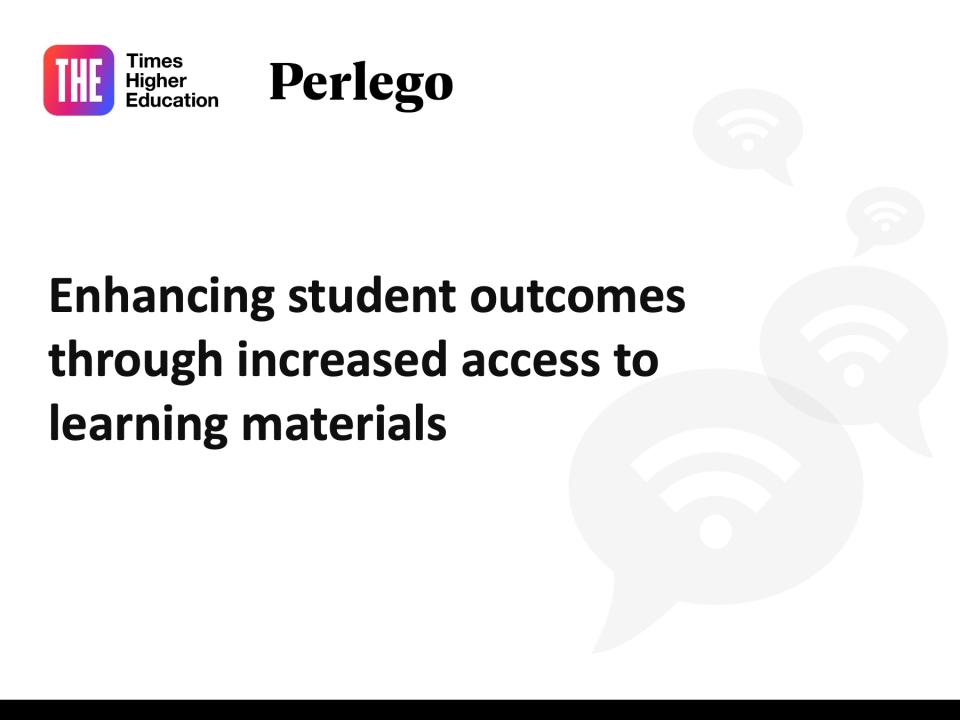Offering students increased and more equitable access to digital learning resources can benefit learners and educators and provide a more engaging university experience.
A Times Higher Education webinar, held in partnership with Perlego, asked an expert panel from academia and industry how institutions can enhance student outcomes through increased access to learning materials.
Chair Alistair Lawrence, head of branded content at THE, said access to a wide range of learning materials enabled students and instructors to deepen their knowledge and have a holistic learning experience. However, fears over prohibitive textbook costs and a lack of access to digital resources could lead to students not getting the outcomes they deserved.
Matt East, learning product manager at Perlego – dubbed by some as “Spotify for textbooks” – said current digital models for content were not built to equally support all students. There were issues around accessibility, availability and concurrency – how many students can access the content at one time.
“Where Perlego is different is we offer unlimited access to over a million textbooks spanning both academic and non-academic subject areas,” East said. “Students can really do exactly what they would have expected to have done in a physical library – that element of serendipitous discovery.”
Institutions were increasingly offering students different pathways, including “on-demand” models of education, said Kirsty Kiezebrink, dean for educational innovation at the University of Aberdeen.
“There’s the modern student journey and there's also the modern student, and they’re a bit different from when I was a student,” Kiezebrink said. “There’s just this more flexible approach to education I think now, a different pathway through it and more ‘build as you go’. Which means we as universities need to support that better. There’s not quite the same rigidity of, ‘an undergraduate degree is three or four years and you follow through in a rigid line’. It’s that more variable pathway and we’ve got to change how we’re providing access and resources for students.”
Elyse Wakelin, head of department at Nottingham Law School at Nottingham Trent University,
pointed out that different student cohorts would have different needs in terms of accessing learning materials. She said the Covid-19 pandemic had been a “driver” for expanding access to digital resources.
“Although every module that we deliver has a core textbook, within that we also offer a range of alternative resources that students may prefer to look at or may wish to also look at,” she said. “It’s really giving access to a wide array of options for students, allowing for their personal preferences and style. And also taking into account things such as disabilities, whereby certain texts may be more appropriate for different types of learners.”
Kate Lindsay, senior vice-president of academic services for EMEA at Higher Ed Partners, said access to digital learning materials was hugely important, especially for those studying fully online programmes.
“Accessibility is key. It needs to be embedded in all of our strategic planning around supporting students to access education, to access the resources they need,” Lindsay said. “I think there’s quite a bit of work to do in changing mindsets of those who are designing learning and teaching for students, in that a textbook isn’t just a textbook anymore. It's something that you can build a learning experience around and within, through getting students to annotate and use those resources as a tool.”
The panel:
- Matt East, learning product manager, Perlego
- Kirsty Kiezebrink, dean for educational innovation, University of Aberdeen
- Alistair Lawrence, head of branded content, Times Higher Education (chair)
- Kate Lindsay, senior vice-president of academic services, EMEA, Higher Ed Partners
- Elyse Wakelin, head of department, Nottingham Law School, Nottingham Trent University
Watch the webinar on demand above or on the THE Connect YouTube channel.
Find out more about Perlego.


comment